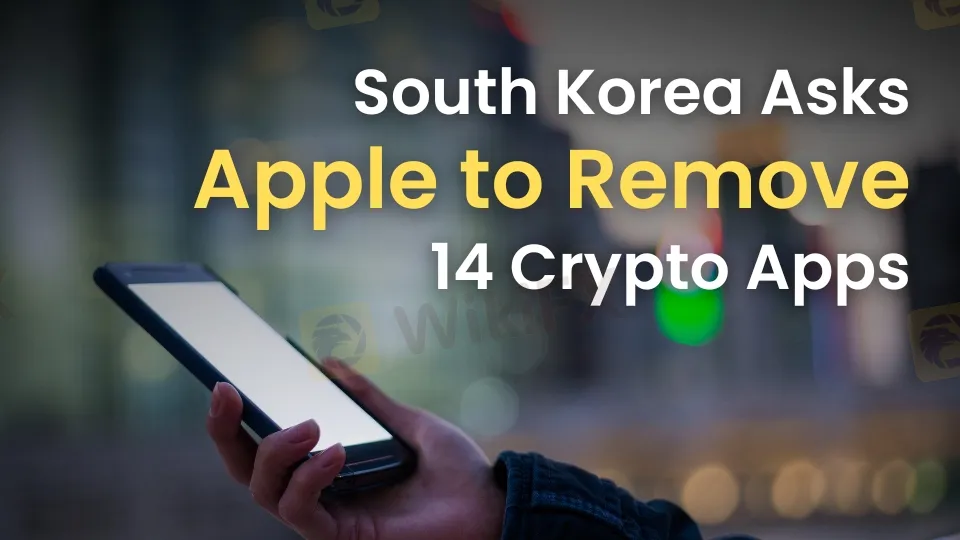简体中文
繁體中文
English
Pусский
日本語
ภาษาไทย
Tiếng Việt
Bahasa Indonesia
Español
हिन्दी
Filippiiniläinen
Français
Deutsch
Português
Türkçe
한국어
العربية
South Korea Urges Apple to Remove 14 Crypto Apps in Crackdown
Abstract:South Korea's FSC pushes to block unregistered crypto platforms like KuCoin and MEXC from app stores to prevent financial crimes and protect users.

South Korea‘s Financial Services Commission (FSC) is stepping up its campaign to shut down unregistered cryptocurrency platforms, with a sharp focus on mobile app stores. The regulator has formally asked Apple to pull 14 cryptocurrency exchange apps, including well-known names like KuCoin and MEXC, from its App Store. This action aligns with South Korea’s strict rules requiring virtual asset service providers (VASPs) to register legally before operating.
The FSCs efforts are supported by its anti-money laundering division, the Financial Information Analysis Institution (FIU). The FIU is working to block both the mobile apps and websites of unregistered companies to reduce financial risks and shield South Korean users from potential fraud. This follows a parallel request to Google, which acted on March 26 by removing 17 apps linked to non-compliant exchanges, including KuCoin and MEXC, from its Play Store.
So far, the FSC has flagged 22 platforms that fail to meet regulatory standards, with most already removed from Googles marketplace. Once Apple follows through, South Korean users will lose the ability to download these apps, and current users will be cut off from updates, limiting app functionality. The FSC has made it clear that operating an unregistered crypto business is illegal, carrying penalties of up to five years in prison or fines as high as 50 million won (about $35,200).

Sanctions Loom for Unregistered VASPs
The FSC and FIU are not stopping at app removals. Theyre weighing tougher punishments, including legal action against firms offering crypto trading, custody, or brokerage services without FIU registration, as required by South Korean law. Failure to comply could lead to significant consequences for these companies.
As of March 31, around 16 million South Koreans—nearly a third of the nation—were active on crypto exchanges, a figure expected to climb past 20 million by year-end. This surge in popularity has drawn sharper attention from regulators, particularly after recent controversies.
On March 20, authorities searched the offices of Bithumb, a major local exchange, over claims that its former CEO, Kim Dae-sik, misused company funds to buy property. Bithumb rejected the allegations, noting that Kim settled the issue by repaying the funds with a loan.
Crypto use is also rising among South Korea‘s public servants. Disclosures show that over 20% of government workers hold digital assets like Bitcoin and Ether, worth close to $10 million combined. This widespread adoption underscores crypto’s growing role in South Korea, even as regulators tighten control to ensure compliance and safety.

Disclaimer:
The views in this article only represent the author's personal views, and do not constitute investment advice on this platform. This platform does not guarantee the accuracy, completeness and timeliness of the information in the article, and will not be liable for any loss caused by the use of or reliance on the information in the article.
Read more

Five UK Financial Firms Collapse, FSCS Offers Support for Affected Clients
Following the collapse of five regulated firms, the FSCS steps in to protect clients through compensation covering deposits, insurance, and other financial services.

CBEX Exposed as Ponzi Scheme, Thousands in Nigeria Affected
Thousands of Nigerians have been defrauded by CBEX, a crypto investment platform posing as a legitimate exchange. The scheme collapsed in April 2025, leaving users unable to withdraw funds.

Why Are More Regulated Brokers Providing Free VPS Services?
Discover why more regulated brokers are offering free VPS services, enhancing trading efficiency, reducing costs, and improving client retention in the competitive trading market.

Hong Kong Warns of CBEX Group Fraud Amid Nigerian Outrage
Hong Kong's 2024 alert revealed CBEX Group's fraudulent activities, misleading investors in Nigeria and beyond. Many face significant financial losses and withdrawal issues.
WikiFX Broker
Latest News
Five UK Financial Firms Collapse, FSCS Offers Support for Affected Clients
Why Trade Agreements Matter to Nations
Non-Existent Online Scheme Took Away RM580,000
RM15 Million Gone in Fake Investment Scam
Think Scams Won’t Happen to You? That’s Exactly What Scammers Count On
Crypto Traders Hit by Scam Using Fake Regulatory Documents, MFSA Cautions
Trade Fights Are Heating Up—What Happens Next?
Juno Markets Upgrades to FYNXT PAMM
Beware of New Scam Tactics Lurking on WhatsApp!!
Italy’s CONSOB Blocks Sites of ITradingFX and NEX TRADE in Latest Crackdown
Currency Calculator


